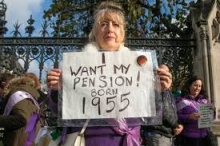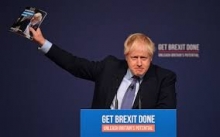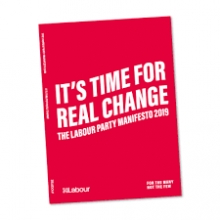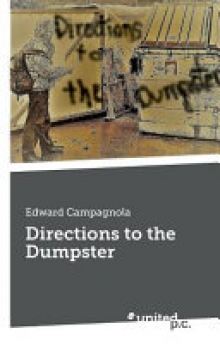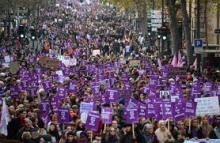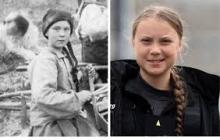Work TV
Watch our TV Channel dedicated to the ‘World of Work’. Explore our video library for informative videos featuring career opportunities at leading companies, franchising opportunities, further education and recruitment professions and their services.
Simon Collyer
WASPI Women Could Shift Election Outcome
WASPI WOMEN - 195,100 women in Wales will be offered a pay-out of up to £31,000 after Labour pledges compensation packages for millions of women hit by state pension age rises imposed by the Tories.
Labour pledges compensation packages for millions of women hit by state pension age rises imposed by the Tories.
Labour will offer pay-outs of up to £31,000, with an average payment of £15,000, to compensate women hit by the Tories’ state pension rise.
The Shadow Chancellor, John McDonnell, said the pay-outs were a “historic debt of honour” to the women.
Labour would introduce a compensation scheme for the 3.7million women hit by the changes, which Cameron’s Tory-Lib Dem government imposed in 2011.
It comes after Boris Johnson u-turned on Friday on his pledge to help those affected.
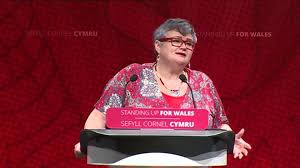
Image: Welsh Labour’s Deputy Leader Carolyn Harris.
Welsh Labour’s Deputy Leader Carolyn Harris and campaigner for 1950s women said:
“While Boris Johnson claims he can’t “magic up” a solution for the 1950s women, Labour has set out a plan that will give women affected the justice they need and deserve.
So many of us know a woman in her sixties whose finances were thrown into disarray by callous changes to the pension age. For many it means great stress and painful cost cutting – but for others it’s been really disastrous. The Tories and the Liberal Democrats should be utterly ashamed of the hardship and distress they have caused these women.
The smirk on Boris Johnson’s face during the TV debate, when he dismissed the concerns of women who’ve been cheated out of their pensions – that told you everything you need to know about him.
The Tories won’t undo the wrong they did to women born in the fifties – so it’s up to Labour to do it for them. It’s clearer than ever: Welsh Labour’s on your side.”
Jeremy Corbyn, Leader of the Labour Party, said:
“This week, Boris Johnson dismissed the concerns of a woman who has lost out on her pension, telling her it’s “not possible” to right the huge wrong she and so many others have suffered. This is about consideration for those who have paid into the system all their lives and made this country what it is, only to be hung out to dry by a government that puts the interests of the richest first.
The next Labour government will compensate women who were unfairly hit by the rise in the state pension age and give them the respect they deserve.
The powerful and wealthy want you to believe that real change is impossible, that it’s not realistic.
But it is possible with Labour. Because Labour is not on the side of the billionaires and the bankers, we are on the side of the people.”
ABC Note: If WASPI women turn out and vote it could shift the election outcome. There has been a lot of anger over this issue.
ABC Comment, have your say below:

National Education Union (NEU) Members Poll on Child Poverty - 62% Report Increase Since 2015
CHILD POVERTY - In a snapshot poll of National Education Union members this year, the growth of child poverty and its visibility within schools and colleges is laid bare.
The poll finds that:
62% of respondents have witnessed an increase in child poverty in their school or college since 2015.
More than a third of respondents told us they have bought food for pupils who cannot afford it (36%), school equipment e.g. stationery (57%), and even items of school uniform (21%).
Effects
When asked to describe the visible effects of child poverty on the pupils and students they teach, members told us:
62% have seen an increase in hungry pupils since 2015. This is the overall figure – amongst primary school teachers, it rises to 71%.
74% have seen an increase since 2015 in the numbers of children without the appropriate uniform, or a uniform in need of replacing. This rises to 81% amongst primary school teachers.
Respondents have also seen a rise in the numbers of children without correct school equipment (64% overall), who are dirty or unwashed (58%), who are unable to participate in school trips and clubs (56%) and, most shockingly, keen to cover up details of their homelife (42%).
In their comments, we heard about:
“More children coming to school hungry and thirsty, worse after a weekend.”
“Children begging other students for food.”
“More children not having eaten, some for days.”
“I teach in a very deprived area. Most of our children don’t have food at home. They are entitled to free school meals but this is the only meal they eat in 24 hours.”
“More families are accessing the food bank and asking for support through breakfast and teatime clubs.”
“We have provided uniform to many children who are unable to pay for it. We pay for shoes too. We have even provided shampoo and basic toiletries to students.”
“Cuts to breakfast club because of cuts to budget.”
“Children without coat or with ill-fitting clothes. Children with ill-fitting shoes.”
“Children with ripped shoes, unclean, tired and thin.”
“Also increased mental health issues and inability to access services.”
“Children with bed bug infestations, rats in their homes.”
“Less and less school contributions for trips, events, fundraisers, families getting into debt with school dinner payments.”
“They just don’t have the money at home and they’re telling us like it’s normal. It’s so sad.”
Solutions
When asked to choose the most effective approach to alleviating the effects of child poverty, respondents chose by a very clear margin – 47% - improvements to family support services (e.g. Sure Start). They also identified reforms to Universal Credit and better access to child benefit (20%), improvements to local job opportunities (15%) and local youth services (11%).
Amongst the comments:
“If family services improved and had more money, then it would not be left to schools to support these young people.”
“Flexible regular working hours for part time jobs so mums with young children can afford to go to work without paying for childcare.”
“I think the criteria for Free School Meals (FSM) needs to be changed, the income cap needs to take into consideration the number of children in a house, £16,000 might be enough for one child families but £17,000 for two or more means those families are worse off but can’t access FSM.”
“Support parents in crisis so kids don’t pay the costs. We also have a number of pupils living with grandparents as parents can’t afford to feed/clothe them. We haven’t seen that before the last few years.”
“Funding for technology. Poorer pupils cannot access online homework which is increasingly being set.”
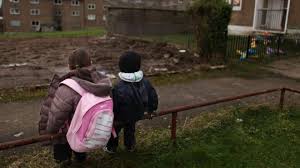
Image: Child Poverty.
Members responded to the survey in the context of:
In 2016/17, 4.1 million children were living in poverty in the UK, an increase of 100,000 on the previous year.
30% of children – or 9 children in a classroom of 30 – are trapped in poverty.
Work does not provide a guaranteed route out of poverty: 67% of the 4.1 million children in poverty have at least one parent in work.
More than 500 children’s centres closed between 2010-18.
We also heard from the TUC this week that the number of children living below the breadline has increased by 38% since 2010.
Commenting on the survey, Kevin Courtney, Joint General Secretary of the National Education Union, said:
“Teachers on the front line know only too well the effects of child poverty, as the harrowing results of this survey demonstrate. It is a sadly familiar tale, but we must not grow immune to hearing it. For every child teachers and school staff know of with broken shoes or who has not eaten, we can be sure there are many more in their school. This is the reality of austerity, and it is lived by too many children and their families each day.
“This election must be about more than Brexit. Enabling the next generation is surely a priority to every voter, and in that we must tackle the scourge of child poverty as a matter of urgency.
“The Government is so insensible to child poverty that it has allowed it to grow unhindered. The scrapping of the Child Poverty Act in 2016 was a reckless act. It points to a deep state of denial about a mess of the Government’s own making.”
Angela Rayner, Labour’s Shadow Education Secretary, said:
“This is yet more shocking evidence that an entire generation of children are paying the price for Conservative cuts.
“Children cannot learn properly when they are hungry. Shamefully it is our schools and teachers that are being left to deal with the consequences of these cuts, while the Tories have looked after the wealthiest.
“Labour will make tackling child poverty the priority it should be, giving all primary school pupils a free healthy meal every day, introducing a real living wage of at least £10 per hour, and transforming our social security system so that it is there for everyone who needs it.”
The online poll of NEU members was conducted between 18-21 October 2019 and received 739 responses.
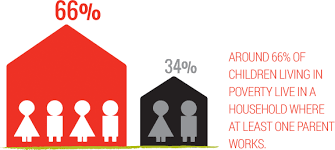
ABC Comments, have your say below:

The Conservative Party Manifesto 2019
TORY PARTY MANIFESTO - The independent charity Full Fact has scrutinised today’s Conservative manifesto launch.
On the cost of new nurses, of which the manifesto promises 50,000, Full Fact calculates that 50,000 extra nurses at pay band 5 (£24,000 per annum) would cost the NHS £2.8bn a year, when factoring in the costs of national insurance, pensions and training. The Conservatives claim their policy will cost the NHS £879m in 2023/24.
On increasing the number of police officers, Full Fact finds that the pledge would return the number of officers to almost, but not quite, the total there was in 2010. Between 2010 and 2019, the number of police officers in England and Wales fell by 20,752 - a 14% drop. But because the country’s population has grown since 2010, the number of police officers per person has fallen by 19%. Recruiting another 20,000 police officers would therefore leave the number of police officers per person at least 6% lower than it was in 2010.
The phrase “Get Brexit done” appears in the Conservative manifesto 22 times, but Brexit is a process, not an event. The UK will stop being a member of the EU if Johnson’s deal goes through, but negotiations with the EU on a future trade deal will take place across a transition period, during which time the UK will still follow EU rules and pay into the EU budget. Based on past deals, this may take years to negotiate.
On increased spending, the manifesto pledges £3bn of extra day-to-day spending by the final years of the next parliament - a figure that looks considerably smaller than pledges from other parties. But these figures aren’t necessarily comparable - the Conservatives did not include costings for every pledge in the manifesto; only for new spending announcements made since the election was called. So while the Conservatives plan to increase annual current spending by £3bn compared to what’s already been announced, the overall annual extra spend will be much higher than that. For example, the manifesto spending list omits its headline pledges on school funding, the NHS, and police officers.
Will Moy, Chief Executive of Full Fact, said:
In less than three weeks’ time, voters will make a decision that will affect their lives and communities. We all deserve information that is accurate and honest, which is why we and others must fully scrutinise the promises made by our politicians.
Candidates and parties are asking voters for their trust for the next five years, and like the other main parties, the Conservatives can do more to meet the standards we expect. Over the next few days we’ll be working with experts to scrutinise today’s claims in depth.
ABC comment, have your say below:

PLEASE download below:

The Labour Party Manifesto 2019
LABOUR PARTY MANIFESTO - For those of you who enjoy a good read we have made the Labour Party Manifesto downloadable.
It is certainly radical.
This is what Charity Full Fact has to say:
Brexit
In his launch speech, Jeremy Corbyn said Boris Johnson’s claim that he will get Brexit done was “a fraud on the British people”.
It’s not fraudulent of Boris Johnson to say his deal gets Brexit done. If approved by parliament, his withdrawal agreement—which is what he refers to as his “oven-ready” deal—would mean that the UK stops being a member of the EU.
But Jeremy Corbyn is right to point out that the Brexit process will continue for many years. Mr Johnson’s withdrawal agreement wouldn’t secure a trade deal with the EU. The UK would enter a “transition period” during which we would still follow EU rules and pay money to the EU. This is set to run until the end of 2020 but could be extended by either one year or two. At the end of the transition period, the UK could either start trading with the EU under the terms of a newly-negotiated trade deal, or start trading with the EU on WTO or “no deal” terms.
Mr Corbyn also cited EU chief Brexit negotiator Michel Barnier as saying a UK-EU Brexit deal would take three years to negotiate.
Michel Barnier’s quote needs to be understood in context. Last month, he said of a future trade deal: “we will have to renegotiate for one year, two years, three years, maybe more in some areas, to rebuild all that will have been pulled apart by the desire of those backing Brexit.”
So he was not totally definitive, and the phrase “in some areas” is important. It might be possible for the UK and EU to conclude the trade deal before some smaller aspects are finalised. For example, the EU’s trade deal with Canada came mostly into force in 2017, but some aspects were not implemented then.
Nonetheless, experts say extending the transition period beyond 2020 “may prove unavoidable”. It’s also worth noting that none of the EU’s other recent free trade agreements have been negotiated and provisionally implemented in under three years. One difference in this case is that Boris Johnson’s government and the EU have already agreed some broad principles for what a future deal should look like.
The EU’s track record brings us on to the question of how long a UK trade deal with the USA would take. Jeremy Corbyn says it would take “even longer” than three years, and he has previously pointed to the EU-Canada trade deal as an example.
That deal took five years to negotiate, and another two before it was provisionally applied. That doesn’t mean a UK-US trade deal necessarily would take as long. We’ve not seen any robust predictions for how long a UK-US deal would take, and we don’t yet know exactly what would be on the table during discussions.
Some major EU trade deals (for example with South Korea and Ukraine) have taken longer than seven years to provisionally implement, while others have been quicker than that.
The NHS
At the manifesto launch Jeremy Corbyn said: “Mr Johnson is preparing to sell out our National Health Service for a United States trade deal that will drive up the cost of medicines and lead to the runaway privatisation of our health service.
“500 million a week of NHS money, enough for 20,000 new nurses, could be handed to big drugs companies as part of a deal now being plotted in secret.”
Boris Johnson addressed similar claims in Tuesday’s ITV debate, saying:
“It is completely untrue. There are no circumstances whatever in which this Government or any Conservative government will put the NHS on the table in any trade negotiation. Our NHS will never be for sale.”
If you are willing to accept Boris Johnson’s promise, you could stop reading now.
We can’t know for sure what any government will do. We can examine some of Labour’s claims and what we know about the trade negotiations and how they might affect the NHS.
The claim that NHS drug costs will increase by £500 million a week is extreme and unrealistic. It has not been the case in countries which have agreed trade deals with the USA, such as Australia. It also depends on a UK government being willing to accept a deal which would increase the costs of the NHS by £27 billion a year.
As we’ve said before a trade deal is unlikely to fundamentally redesign the way the NHS is funded and American companies can already bid for private contracts to provide clinical services in England (health services in Scotland and Wales are devolved and are not run on the basis of contracts.)
In both cases there are genuine concerns.
Published US negotiating objectives for a UK-US trade deal make clear that the US aims to improve the access that US pharmaceutical companies have in the UK. It is possible that this will have some impact on drug prices.
Meanwhile, one concern about a trade deal is that the “investor protection” mechanisms could stop a future UK government from reducing the levels of private provision within the NHS without paying compensation to US investors. The British Medical Association has called for the NHS to be carved-out from the investor protection mechanisms of any future UK trade agreement.
We've looked at this in greater depth here.
The Labour manifesto claims that there are 100,000 staff vacancies in NHS England, including a shortage of 43,000 nurses.
There were around 96,000 staff whole-time equivalent (WTE) vacancies in NHS trusts in England between January and March 2019, according to information from NHS Improvement. Whole-time equivalent refers to the number of staff there would be if their hours were all added together to create only full-time jobs.
This data only goes back to the first quarter of 2017/18 and has stayed at around 100,000 since then.
Importantly, just because there are 96,000 vacancies overall doesn’t mean no-one is doing those jobs. NHS Improvement has previously said that between 90-95% of these vacancies were being filled by temporary staff.
There are around 39,500 WTE nursing vacancies. The 43,000 figure reflected the vacancies in autumn 2018 and so is now slightly out of date.
All this data from NHS Improvement is based on management information and is not an official statistic, so should be treated with some caution.
The manifesto also claims that there are 15,000 fewer hospital beds.
This is correct for NHS England. Since the Conservatives came to office as part of the Coalition government in 2010, the number of overnight beds available in the English NHS has fallen by 15,800 (or 11%). If you include day only beds then the number has fallen by 14,900 (or 10%). But this itself doesn’t tell you much about the quality of the health service.
Medical advancements mean that the need for beds has fallen over time. The NHS is getting more efficient at seeing patients in hospital and more of us are being seen on the same day rather than staying overnight.
To see how often the beds we do have are being used we can look at the bed occupancy rate. The proportion of general and acute beds occupied averaged over 90% in 2018/19, experts have suggested that bed occupancy at this level indicates a shortage of beds.
Labour goes on to say that every winter, bed occupancy rates exceed dangerous levels.
It depends on your definition of dangerous levels. In the Winter of 2017, NHS Improvement and NHS England said bed occupancy should be below 92% to maintain patient flow. The Royal College of Emergency Medicine and the Royal College recommends that the threshold should be 85%. According to the Nuffield Trust, every hospital trust’s average bed occupancy was above 85% last winter.
The Labour manifesto claims that, in the UK, life expectancy is stalling and infant mortality rates are increasing, especially among those living in our most deprived communities.
Life expectancy growth has slowed in recent years and has almost stopped. In some local authorities in the UK it’s falling.
The infant mortality rate (which is the number of deaths for those under one per 1,000 live births) across the UK has been 3.9 since 2013. The most up-to-date figures are for 2017. For England, the number slightly increased from 3.9 to 4 between 2016 and 2017, and from 3.1 to 3.4 in Wales. The rate dropped in Northern Ireland between these years and stayed the same in Scotland.
Environment
The manifesto contained a number of claims about the environment. It said that “just 100 companies globally are responsible for the majority of carbon emissions.”
This claim needs some context. It comes from a 2017 report from a charity which works with companies to publish their environmental impact data. Excluding some things like agricultural methane, between 1988 and 2015, 71% of the estimated greenhouse gas emissions from human activity originated from 100 fossil fuel producing companies.
This includes the emissions released when this fuel was used by their customers.
The manifesto also said: “Our polluted air contributes to over 40,000 premature deaths a year.”
The claim that there are 40,000 premature deaths a year comes from a 2016 report from the Royal College of Physicians and the Royal College of Paediatrics and Child Health. The report looks at the number of attributable deaths from the amount of particulate matter (very small solid and liquid material between the size of a virus and the thickness of a human hair) in the air and the number of deaths attributable to nitrogen dioxide (a toxic gas which comes from petrol or diesel car engines or natural gas in a domestic central heating boiler or power station) in the air.
However, these numbers should be viewed with some amount of caution. It is not the case that these are all individuals who have pollution on their death certificate as their cause of death. Air pollution generally makes existing illnesses worse rather than directly killing people. This number is based on an estimate which is derived from large scale studies with large margins of error.
The manifesto also claimed that “energy use in buildings accounts for 56% of the UK’s total emissions, making it the single most polluting sector.”
This doesn’t seem quite right. Transport is the single biggest sector for emissions in the UK at 27%.
We’ve seen Labour make a similar claim before, that “electricity and heat use in buildings, when taken together represent 56% of the UK total” of emissions. This seems to come from government breakdowns on which sectors released the most greenhouse gas emissions in 2017.
It looks like Labour added together the emissions that come from the energy supply sector (24%), business (17%) and residential (15%) sectors, to get 56% of total emissions.
But it’s unclear how this relates to ‘buildings’ as Labour claims and we’re going to look into this further.
Tax
Jeremy Corbyn also said Labour’s manifesto was costed with:
“No increases in VAT or income tax or National Insurance for anyone earning less than £80,000.
“There is no increase for 95% of taxpayers.”
It’s correct that the Labour manifesto plans no increases in VAT, income tax or National Insurance for people earning less than £80,000.
It’s also correct that people earning less than £80,000 account for around 95% of taxpayers (somewhere between 95% and 96% according to 2016/17 figures from HMRC).
But that doesn’t mean Labour plans no tax rises whatsoever for these people, because there’s more to tax than just VAT, income tax and National Insurance.
For example Labour’s manifesto commits to scrapping marriage allowance, a policy introduced in 2015 which gives a tax break to couples with a combined income of under £62,500.
In 2018/19, 1.78 million people claimed marriage allowance at a cost of £485 million.
Apart from that there are various other taxes that could affect people with salaries of under £80,000.
Labour has pledged to reverse cuts to inheritance tax made by the Conservatives since 2017, which allowed people to pass on an amount of property tax-free, in addition to the existing £325,000 tax free allowance which applies to all assets.
Scrapping the property allowance will obviously affect higher earners more than lower earners, but that’s not to say that people earning less than £80,000 will be unaffected by the proposal.
Labour has also proposed extending the sugar tax to milk-based drinks, which will affect everyone who buys those products, regardless of salary.
Aside from taxes that affect individuals directly, there’s also taxes on businesses to consider.
Labour also plans to put corporation tax back up to 26%, following reductions over the past nine years.
We typically think of corporation tax being associated with large companies, but corporation tax is paid by all limited businesses.
Around one million UK businesses in 2017/18 had a corporation tax bill of up to £10,000, meaning in most cases their profits would have been no higher than £53,000.
Reversing reductions to corporation tax would affect the owners of these businesses some of whom will earn below £80,000 per year.
Crime
Labour says the Conservatives have taken "21,000 police officers off our streets". It’s correct that there are 20,600 fewer officers in England and Wales between March 2010 and March 2019. The number is close to the lowest recorded level since the early 1980s.
These figures refer to the number of full time equivalent officers (or how many there would be if you added up all their hours to make full time roles).
The party claims "recorded crime has risen, including violent crimes". This is not what’s happening in reality.
The number of crimes and violent crimes “recorded” by the police have risen, but those figures don’t show what’s really happening as they substantially reflect improved recording practices and can only ever reflect what comes to the attention of police.
Overall levels of crime have “remained broadly stable in recent years,'' after decades of reductions according to the Office for National Statistics, based on figures from the Crime Survey for England and Wales. There has also been little change in overall levels of violent crime.
These figures are based on a survey of adults who recall their experiences of crime, and while they’re better at measuring crime than the police figures are, they still have limitations.
Labour also claims knife crime is "up 80% in the last five years". You can get figures of around 80% depending on which time period you look at, but this is generally what’s been happening to recorded knife crimes between 2014/15 and 2018/19.
Again, we can’t fully rely on police figures to tell us what’s happening to crime, but there’s some additional evidence from hospital admissions that knife crime is getting worse. The Crime Survey is much less useful at giving us a clear picture on this kind of crime, as it happens relatively rarely.
Labour also focuses on hate crimes, saying they’ve "more than doubled in the last five years", and that disability hate crimes have gone "up 37% in the last year alone".
That second claim is inaccurate. Recorded disability hate crimes have gone up 14% in the past year in England and Wales—37% is the rise in transgender hate crimes.
Recorded hate crimes have doubled between 2012/13 and 2018/19, but again, all these changes have been mainly driven by improvements in how the police record crime, and also probably by growing awareness of hate crimes leading to increased reporting.
Social care
The manifesto said that “Social care funding cuts have left 1.5 million older people without the care they need.”
This figure comes from Age UK analysis that says the number of older people in England with some level of unmet need is 1.5 million. Age UK told us it used the English Longitudinal Study of Ageing for 2016/17, which is a survey that asks older people a number of questions about their needs, and what help they are given.
Age UK’s definition of people who had an unmet need for social care was if they “have difficulty with one or more of six activities of daily living (washing, dressing, getting in or out of bed, using the toilet, eating, walking across a room)” and “either receive no formal or informal help with these difficulties, or any help they receive, either from formal or informal sources, does not meet their needs”.
The researchers then scaled up the responses using population population data from the Office for National Statistics to the number of people over 65, to get an estimate of 1.5 million.
Age UK did not make any assessment of the extent to which reductions to social care funding are the reason for unmet needs among older people.
The manifesto also said “Almost £8 billion has been lost from social care budgets since 2010.”
This figure refers to the savings councils in England have made on adult social care spending since 2010, not the amount their overall adult social care budgets were reduced by.
The councils reported having made £7.7 billion (£8.3 billion after factoring in inflation) of savings through things like efficiency measures and contract renegotiations. This all comes from a report by the Association of Directors of Adult Social Services.
Since 2010/11, annual council spending on adult social care services has fallen by around 2% in real terms from around £16.5 billion to £16.1 billion in 2018/19. During that period, spending initially fell more sharply before rising again in recent years.
We’ve written more about this claim here.
Poverty
The Labour party claims that “work no longer guarantees a way out of poverty. Of 14.3 million people in poverty, nine million live in families where at least one adult works."
It’s correct that an estimated 14.3 million people live in poverty in the UK as of 2017/18, according to the independent Social Metrics Commission (SMC). While this is probably the best available estimate available, it isn’t a definitive figure: poverty means different things to different people and putting a specific number on it will always just give one perspective.
Of those, the same research estimates there are nine million families with at least one adult in work. In other words, more than six in ten people in poverty live in a family where someone works.
There are also official statistics on low income published by the government, which are often used as measures of poverty, although they’re less comprehensive than the figures we’ve discussed above.
They show that, in 2017/18, 57% of people in relatively poverty were in a household where someone works, and that’s been on a rising trend for decades.
Labour also says that "400,000 pensioners have been pushed into poverty". This isn’t accurate according to the SMC—which seems to have been Labour’s source for its figures on overall and in-work poverty. The SMC estimates that pensioner poverty has not significantly changed at all since 2010.
But the government’s data on pensioner poverty does show an increase of about 400,000 between 2009/10 and 2017/18, using a measure of relative low income.
ABC Comment, have your say below:

PLEASE download below:

High Pay Centre - Shareholder Returns 2019
SHAREHOLDER RETURNS - Dividend payments are soaring as wages stagnate.
From the Executive Summary.
New analysis of dividends and share buybacks paid by the FTSE 100 over the last five years reveals the extent to which companies protect and increase payments to shareholders, even when company finances are struggling.
Putting shareholders first means less money for workers and other stakeholders, hampering efforts to tackle in-work poverty and climate change. From 2014 to 2018, returns to shareholders across the FTSE 100 rose by 56%, growing nearly seven times faster than the median wage for UK workers, which increased by just 8.8% (both nominal).
Over the same period, the UK’s largest listed companies generated £551 billion in profit (net income attributable to shareholders), and paid out £442 billion in dividends and buybacks.
Even a small proportion of this money could mean better wages and working conditions for their staff and workers in their supply chains. The UK’s largest companies could play an important role in reducing poverty and inequality, but the current business model is designed to maximise profit for shareholders.
Employing 6.3 million people worldwide, with many more in their supply chains, their actions have a major impact on global working conditions and living standards. 1 in 10 working households in the UK live in poverty, comprising eight million people in total, while at the same time the richest 34 people own the same wealth as the poorest 40% of the UK combined.
ABC Comment, have your say below:

PLEASE download the report below:

Directions to the Dumpster, a Book By Homeless Advocate, Activist Edward Campagnola
NEW BOOK - Author, homeless advocate, activist Edward Campagnola has written and launched a book ‘Directions to the Dumpster’.
"Directions to the Dumpster", an account of St Life and the attempts to find home again in a ruthless, uncaring and violent US society.
The book transcends genre and audience, enlightening, thought provoking, and dispels misconceptions.
An Important, socially significant, fantastic story for our time, with romance, politics, sports, drama, death, grief, action adventure, travel, success, failure and love.

Image: Edward Campagnola.
About the author Edward Campagnola.
54 years on Earth. Born to Italian immigrant dad and Irish sixth generation American mom, both NYC. Raised in Hackensack, NJ, father of a son and daughter. Single widowed, wife Karen passed, breast cancer, 2006. Activist for any injustice, worked for Citizen Action/Clean water Action, former, Owner/Op NYC Car service and Sports Official. I’m trying to create a forum, through novel, for homeless issue, as an advocate and to pursue my agenda, to say what needs to be said, Global Social Democracy now!
Facebook https://www.facebook.com/directionstothedumpster/
Twitter https://twitter.com/Direct2dumpster
AMAZON: https://www.amazon.com/Directions-Dumpster-Edward-Campagnola/dp/1642680710
Format: 12 x 19 cm
Number of Pages: 138
ISBN: 978-1-64268-071-3
Release Date: 02.05.2019
And
At least 36,000 homeless people live in the city of Los Angeles, but L.A. simultaneously has more than 41,000 empty housing units, according to a report released Tuesday by UCLA law students and a coalition of economic justice organizations.
Researchers from the UCLA School of Law and nonprofit groups Strategic Actions for a Just Economy and the Alliance of Californians for Community Empowerment, who authored the report, found many of these units were purchased or built as long-term financial investments, and that allowing them to sit unoccupied worsens the region's housing shortage.
ABC Note: "Directions to the Dumpster" sounds like a good Christmas read.
ABC Comment, have your say below:

November 25 - International Day for The Elimination of Violence Against Women
VIOLENCE AGAINST WOMEN - On the International Day for the Elimination of Violence against Women this year, people around the world are thinking of all those women who have been injured and even sacrificed their lives amid police and military violence during protests for freedom and democracy in various parts of the world – from Hong Kong and Chile to Bolivia and Lebanon.
There have been large demonstrations in France this weekend highlighting Femicide.
This date was selected to honour the Mirabal sisters, three political activists from the Dominican Republic who were brutally murdered in 1960 by order of the country’s ruler, Rafael Trujillo (1930-1961).
On 7 February 2000, the General Assembly officially designated 25 November as the International day for the Elimination of Violence against Women to raise public awareness of the issue every year on that date.
One in three women and girls, irrespective of their economic status, experience violence in their lifetime. In a year of reckoning over sexual harassment in the workplace amid the #MeToo scandals, domestic workers -- a group mostly comprised of women working in private quarters, under the immense discretion of their employers -- remain vulnerable.
The adoption of the ILO Convention 190 on Ending Violence and Harassment in the World of Work at the International Labour Conference in June this year is going to change our lives and those of many women. The Convention states that governments shall adopt legislation ensuring the right to equality and non-discrimination in employment and occupation for all. Employers are required to take measures to prevent violence and harassment.
ABC Note: Violence against women occurs every day at an unacceptable scale. Together we can stop it.
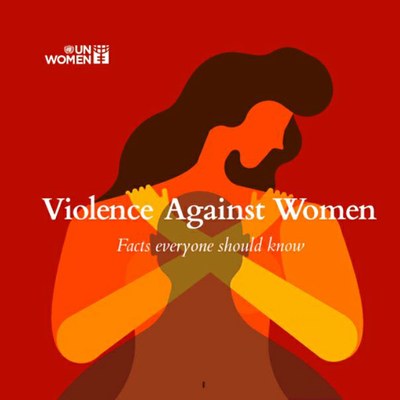
ABC Comment, have your say below:

Two Fabulous Invitations From the ISMA Conferance
INVITES - The ABC is talking to Steve Hyland on Monday. Steve runs his own business TV channel on the Internet and coaches people to present themselves in the media. We are looking forward to talking to Steve and his team.
We also met at the ISMA conferance Stephanie Rottet who has invited us to her next event in London.

Image: Stephanie Rottet
Simon, I am in Los Angeles, building the momentum around the World INLIGHT Partners movement - powered by THE LOVE ARMY. Mission: bring Love and Spirit back into the business world.
There followed an invite...to Stephanie's next London event. Whoopee doo as they say.
We all need more love and compassion in this world - business cannot just be about making profit.
There is a higher purpose in all human activity - there must be...for life to have any meaning.
Or, it's a lonely world indeed...
ABC Comment, have your say below

We Find Inspiration in Greta Thunberg and The Doors
ENVIROMENT - Greta Thunberg to guest edit Radio 4's Today programme.
When you are struggling, worrying about the environment and the ecosystem might seem low on the agenda.
The BBC has come under fire during the BREXIT debate from the right wing, but choosing Greta as guest editor is inspired.
You might enjoy the Doors in concert and their comments on environmentalism from the concert back in 1968.
Humanity has lost its way. It make take a 16 year old girl to get us back on track. And the ABC of course!!!
ABC Comment have your say below:

Universal Credit Christmas Bonus - Who Gets It?
CHRISTMAS BONUS - Some Universal Credit claimants are due the Christmas bonus of £10 but not others.
Universal Credit is not really universal.
We hope the money will not spoil you. It is welcome none the less.
Who will get it? Those in reciept of:
- Armed Forces Independence Payment
- Attendance Allowance
- Carer’s Allowance
- Constant Attendance Allowance (paid under Industrial Injuries or War Pensions schemes)
- Contribution-based Employment and Support Allowance (once the main phase of the benefit is entered after the first 13 weeks of claim)
- Disability Living Allowance
- Incapacity Benefit at the long-term rate
- Industrial Death Benefit (for widows or widowers)
- Mobility Supplement
- Pension Credit - the guarantee element
- Personal Independence Payment (PIP)
- State Pension (including Graduated Retirement Benefit)
- Severe Disablement Allowance (transitionally protected)
- Unemployability Supplement or Allowance (paid under Industrial Injuries or War Pensions schemes)
- War Disablement Pension at State Pension age
- War Widow’s Pension
- Widowed Mother’s Allowance
- Widowed Parent’s Allowance
- Widow’s Pension
Those on Universal Credit won't be automatically entitled to the bonus, and must meet one of the categories outlined above to receive it.
Couples who are married, in a civil partnership or are living together will both receive the bonus if they both fall under one of the categories outlined above.
How do I claim the Christmas Bonus?
If you're eligible, you won't need to do anything as the money will be automatically transferred into the same account that your usual benefits are paid into.
If you do receive it, the Christmas Bonus may show up with a transaction ID of 'DWP XB' in your bank account.
ABC Comment, have your say below:


